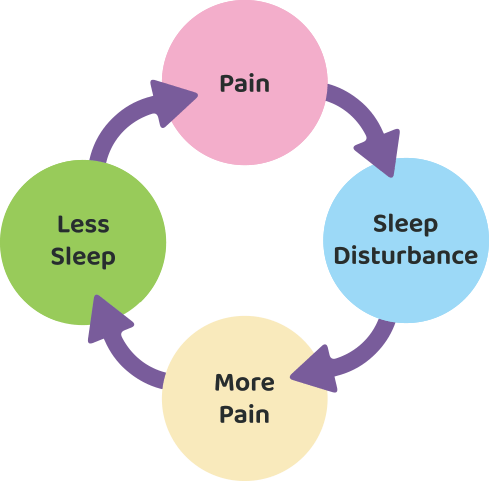Sleeping Problems: Fibromyalgia Symptoms
There are a number of different conditions that that can cause a multitude of sleep disturbances. Conditions such as such as Insomnia, Sleep Apnea and Restless Leg Syndrome, make it difficult for anyone suffering from them, to get to sleep or achieve quality sleep. Moreover, Fibromyalgia and CFS/ME sufferers also have the added complications of their condition involving a wide range of systems in the body including the Nervous System and Endocrine system thus finding ourselves wide awake at bed time, due to the affects to our inner body clock. This also leads to us not getting enough REM sleep which is vital for restoring the whole body.
REM Sleep (Rapid Eye Movement)
REM sleep is one of 5 different stages of sleep. It occurs several times during your sleep cycle. It is categorised by a series of changes including: rapid eye movements made during this stage along with twitching of the face and limbs, dreaming, fast and irregular breathing.
During REM sleep, your body is restored to enable you to function each day. However, if we do not reach REM sleep or get enough restorative sleep, this will lead to us waking the following day with increased levels of pain, stiffness, fatigue and fibro fog.
To help us reach REM Sleep it is recommended that a sleep hygiene routine is followed every day. However, for those of us trapped on the sleep – pain cycle, it can be very hard to achieve as our adrenal glands are constantly in fight of flight mode, which keeps us alert. This in turn has an effect on our cortisol levels, when we wake, they can be lower than they should be.

Affects approximately 70%
Caused by elevated arousal
Later stages of sleep
Morning stiffness & fatigue is common
Daytime drowsiness - Amplifies pain
Insomnia
Difficulty falling asleep
Including difficulty finding a comfortable sleeping position
Waking during the night
Including difficulty finding a comfortable sleeping position
Unable to focus
Not able to focus on daily tasks, difficulty in remembering things, trouble concentrating
Depression & Anxiety
Frequent irritablity, acting aggressively or impulsively
Low energy
Feeling fatigued, having low energy throughout the day and daytime sleepiness
Restless Leg Syndrome
Restless leg always seems to trigger when we have just got in bed and you just start to fall asleep, then your legs start moving uncontrollably with a surge of pressure and aches in your lower limbs and feet. It then prevents you from falling asleep.
There doesn’t seem to be an obvious cause in most cases, however, it has been linked by some neurologists to the nervous system. As Fibromyalgia effects the nervous system, Restless Leg could be the result of over-active nerves.
Tingling in one or both legs
50% of fibro sufferers have this condition
Wakes you up multiple times at night
Strike right as you start to relax your muscles
Connection between the overactive nerves and neurological system
Caused by abnormal activity in leg muscles
Legs want to move in awkward ways
Muscle movements
Muscles jerk, twitch, shake creating crawling sensation
Symptoms differ from person to person
Common traits: Legs feeling and acting restless when relaxed and still
Treatment
Not all cases require treatment. However, if it frequently occurs:
- Work with your GP to check for nutritional deficiencies
- No stimulants like caffeine close to bedtime
- The GP may check for other conditions
- Learn massage techniques
- Hot and cold
- Wrapping feet
Sleep Apnea
Sleep apnea is a potentially serious sleep disorder where the muscles in the throat relax and causes your breathing to repeatedly stop and start.
Signs and symptoms of obstructive sleep apnea include:
Excessive daytime sleepiness
Loud snoring
Observed episodes of stopped breathing during sleep
Abrupt awakenings accompanied by gasping or choking
Awakening with a dry mouth or sore throat
Morning headache
Difficulty concentrating during the day
Experiencing mood changes, such as depression or irritability
High blood pressure
Night-time sweating
Decreased libido
Causes of Sleep Apnea
Obstructive sleep apnea is the most common type of Apnea. It occurs when your throat muscles relax too much and narrow the air way so much that it stops you from breathing normally. If your breathing is repeatedly impaired for a minimum of 10 seconds it may lower your oxygen levels in your blood and cause a build-up of carbon dioxide.
Risks to developing Obstructive Sleep Apnea
- Excess weight. However, thin people can develop the disorder.
- Narrowed airway
- High blood pressure (hypertension)
- Chronic nasal congestion
- Smoking
- Diabetes
- Asthma
- Gender
- Hereditary
Over-lapping symptoms with Fibromyalgia and CFS include fatigue and lack of concentration.
Other reasons for difficulity sleeping
There is a long list of reasons why people find it difficult to sleep. Below are some common reasons and possible solutions and ideas to create an effective sleep hygiene routine.
- Adrenal stress and cortisol imbalance
- Lack of exercise
- Nightly second winds/ can’t turn the brain off
- Dependency on sleep medications
- Eating the wrong food types later in the day / sugar
- Wireless Radiation
- A snoring spouse
- Time for a new mattress
- Staying in the house, working from home
- Hormone imbalance can affect sleep and relaxation
Sleep Hygiene Routine
Dark environment
Extra pillows
Room Temperature
Use the bedroom to sleep
Avoid Caffeine
Routine
Prior to bed time
- Remove highly fragranced items
- Wash sheets and Pj’s in non-fragranced wash liquid
- Turn off any screens 2 hours before bedtime to allow the brain to adjust getting ready for sleep. Turn off wifi.
- Practice tai chi or yoga to calm the mind and body
- Take a hot bath or shower to relax
- Massage your feet and legs
- Read a hard copy book
- Keep routine, go to bed and get up same time daily.
In the bedroom
- Use bedroom to sleep
- Dark environment
- Extra pillows
- Room temperature low
- Deep breathing
- Relaxation
- Banish snoring spouse to the spare room
If you do wake up in the night instead of lying-in bed in pain, maybe get up and have a cup of tea or read for a short while, then go back to bed and try again. Try not to beat yourself up about it. Stay calm and relaxed. It is frustrating, especially if you have commitments the following day.
Programmes and activities that Fibro Active offer to help manage your symptoms
Fibro Active have several programmes and activities that can help you with your symptoms of Fibromyalgia. We focus on a healthy lifestyle, gentle exercise and sharing information whilst supporting it's members to accept and manage their illness in a positive and friendly atmosphere.
Tai Chi & Qigong Classes
Tai Chi for Arthritis is designed to enable people to be active when they are unable to participate in other forms of exercise. For more information as well as times and dates please visit our Tai Chi page.
Fibro Podcast
Tune in to our Fibro Podcasts, where we showcase candid discussions, expert insights, and personal narratives addressing diverse facets of life with Fibromyalgia and Chronic Fatigue Syndrome.
Bulletin Board
For additional details about the group, explore our Bulletin Board. There, you'll discover current information on all the activities the group engages in, ranging from upcoming events to the group program.













